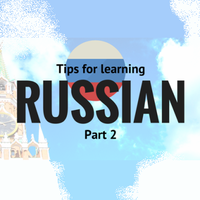Tips on Learning Russian (2)
The bigger problem is “you go”, which is multidirectional, “you go all the time”. If “you go and come back”, that's one verb, but if you are “going there”, that's another verb. If “you go on a means of transportation”, that's another verb and that also has its multidirectional and unidirectional form and that's just for “go”. Then there are “carry”, “come”, “fly” and “swim”, very difficult to get a handle on and to actually be able to reproduce. It doesn't prevent you from understanding the language, but it is very difficult to nail it down when you're speaking. I have read these definitions so many times. “If the action was completed, was supposed to be completed, might have been completed or was never going to be completed, then you use one form. But if, in fact, it was completed or might have been completed, except for the other exceptions, then you use this other form”. I don't understand it. I've read them so many times. Here, again, it's just exposure because you can't be trying to go through all these logical explanations while you're speaking. To my mind, you have to expose yourself to a lot of the language and then eventually start speaking a lot.
I could get into other issues that are different, but they're minor. Like in Russian there isn't only “where” but also “from where” and “to where”, and they are actually different words. Those are minor issues. The big problems in Russian are those three bugbears, cases, verbs of motion and aspects of verbs.
Now, the good news, Russian is fascinating. It's a beautiful language. The country is fascinating. The culture and history are fascinating. The people who appear somewhat stoic are, in fact, very warm. They tend to speak their minds, say what they think and not worry too much about the details, but that's what makes them so fun to be around. I would say, too, that in Russia there's no compromise. I think that's how they approach even artistic creation or sports. That's why we see a lot of artistic creation in Russia, outstanding ballerinas, musicians and scientists. Certainly in hockey I find the Russians are just magicians. They're artists and so they have a tendency to really commit themselves in one direction.

